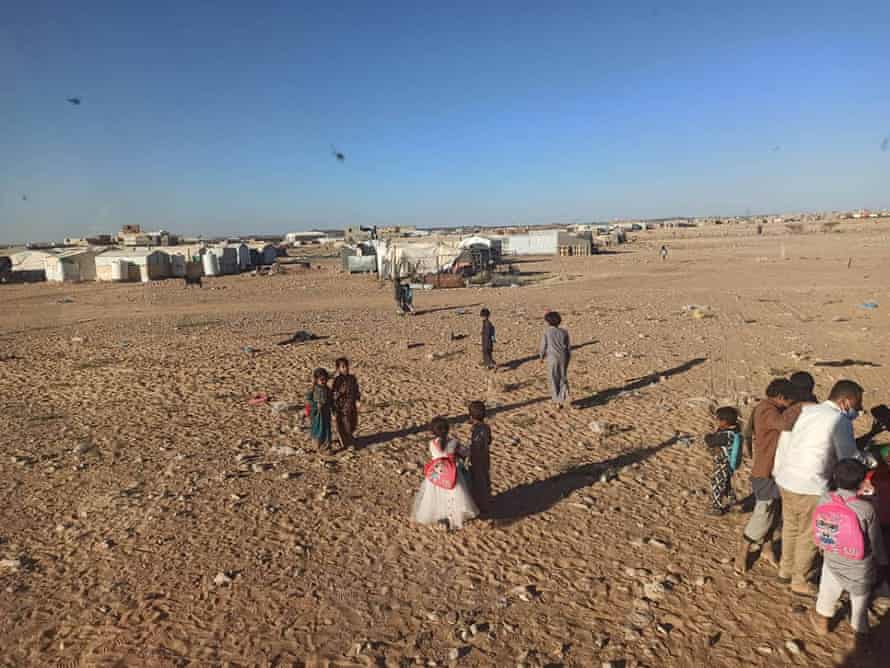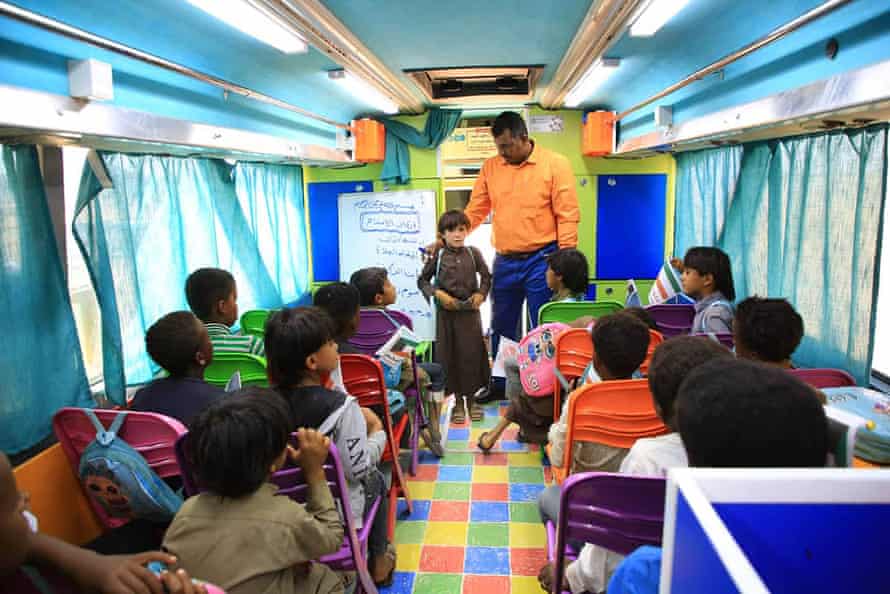Originally posted to The Guardian website, 21 April 2021
Mobile classrooms are crossing deserts to reach some of the two million Yemeni children missing school due to the civil war.
When the big yellow school bus pulled up on the outskirts of the desert camp, eight-year-old Doaa Yehia could not have been more excited. She had not been to school since her family left their home in northern Yemen last year to escape civil war.
Living in Mafraqrefugee camp in the Al Abr district of Hadramawat in the east of the country, Doaa is more than 7 miles (12km) from the nearest school. It is a commute too far and too costly for her parents. So when Edris, as the bus is known, arrived at the camp in January, Doaa was “extremely thrilled”.
“It’s so great to be back at school,” she says as she runs to a class.
For three months, from 8am to noon every day except Fridays, children aged six to 10 went to school. Sitting on colourful chairs outside in the shade of the bus awnings, or inside on the chequered floor, 94 children received intensive lessons in Arabic, Islamic studies, mathematics and science, to help them catch up with the learning they have missed because of the war, which has displaced more than 4 million people since 2015.
According to Unicef figures, 2 million Yemeni children are out of school because of the conflict. More than 460 schools have been attacked across the country, and more than 2,500 schools have been damaged, or are being used for non-educational purposes, including by armed groups.

The Edris bus, funded by Kuwait’s Rahma International Association in collaboration with local authorities, is an attempt to get children back into class. Mafraq camp was the first to be visited because it hosts the most displaced families (309 of them) and has a large number of children out of school, says Abduljabar Mohamed al-Dharasi, who manages the camps for displaced people in the district.
“We gave priority to older children, as we could not take them all in due to the limited capacity,” he adds.
Osama al-Makbouli’s first experience of school has been on the bus. The seven-year-old moved from Haradh to the camp with his mother in 2019. “Before Edris, I spent my days bored in the tent. We have no television here and I had no friends. Here, it’s fun,” he says, clasping the school bag and books he was given on his first day.
Teaching here has been an experience like no other, says Fady Abu Eiran, one of the four teachers working on Edris. Aside from the days when wind, dust and heat forced the cancellation of lessons outside, the pupils were “more responsive and attentive to what they’re being taught, as they’ve been deprived of the experience of classroom for a long time,” he said.
“Many were orphans who lost their fathers, which is something I had to bear in mind when dealing with them. A few were more sensitive than others, more shy. We introduced a day with fun events, which worked in helping these students open up to one another.”
Um Ayman, a widow and mother of three, was grateful her children were among those selected to attend. “It filled up their mornings and distracted them from playing around on the streets. They also pay more attention to personal hygiene because they’re encouraged to do so at school,” she said.

Five more buses, which will have trailers attached to carry more equipment, are expected to visit camps in Hadramawat and neighbouring Marib governorate in the coming month, said Ra’ed Ibrahim, chairman of Al-Twasul for Human Development, the local NGO running the mobile classrooms. He hopes to reach 5,000 displaced children each academic year.
“In June, five different refugee camps will be targeted, teaching a total of 620 students,” he said.
Assessments are held at the end of each week to check students’ progress. After three months, pupils sit exams and, if they pass, receive certificates, which means they will have an official document to present to a school when they eventually enrol.
In Mafraq, all 94 students received their certificates.
This article was written in collaboration with Egab.


